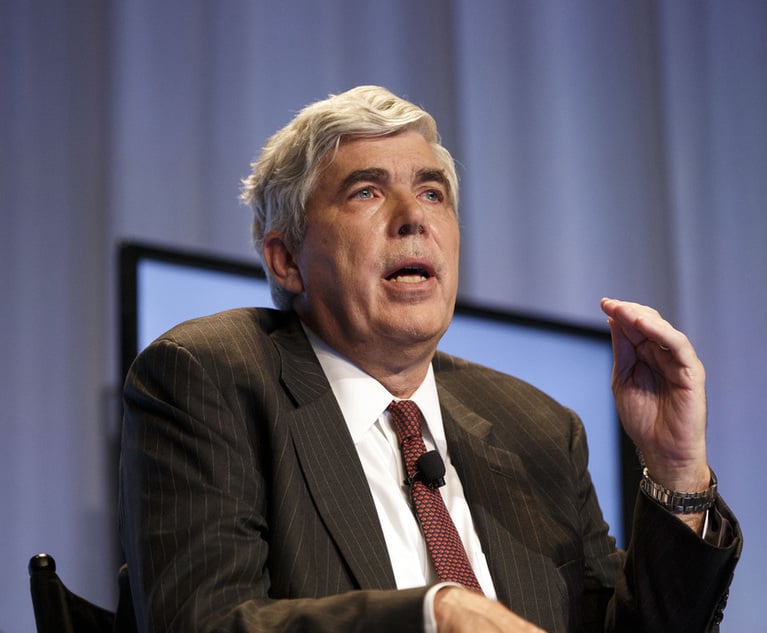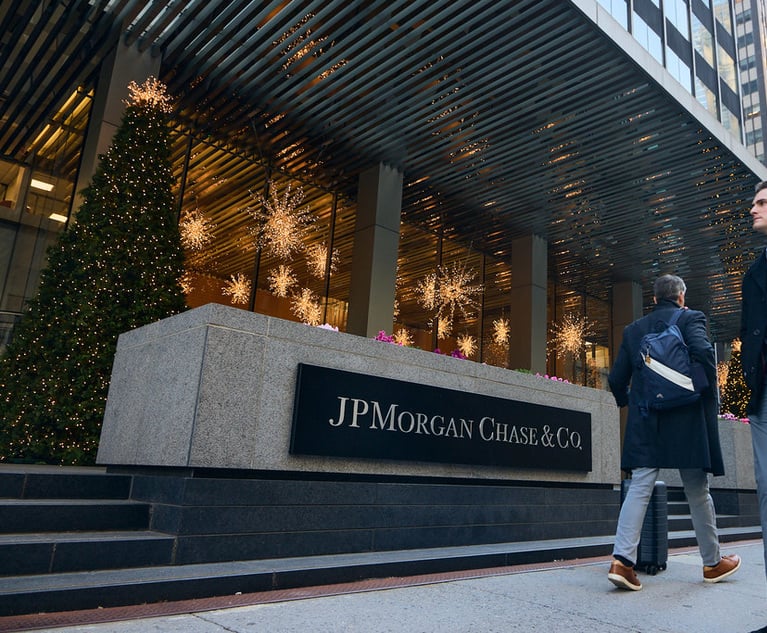Finders Weepers: NYAG Proposes State Registration Requirement
One would expect there to be significant public comment on New York's proposed finder registration requirement before adoption.
April 16, 2020 at 11:15 AM
6 minute read
 Patrick T. McCloskey
Patrick T. McCloskey
On April 6, 2020 New York State Attorney General Letitia James announced proposed amendments to the regulations governing state securities registration, including a specific requirement that finders register as broker-dealers in New York. Notice of the proposed regulation amendments were published in the New York State Register on April 15, 2020, commencing a 60-day public comment period.
Currently, the New York laws and regulations governing broker-dealer registration, namely §359-e of the General Business Law (GBL) and Article 13 Title 10 of the New York Codes, Rules and Regulations (NYCRR), are silent as to the status of finders, whose activities are typically limited to introducing prospective investors to issuers in exchange for a fee.
The finder definition, proposed to be codified in a new 13 NYCRR §10.10(a)(8), reads:
A "Finder" shall mean a person, firm, association, or corporation who as part of a regular business, engages in the business of effecting transactions in securities for the account of others within or from [New York State], to the limited extent that such person, firm, association, or corporation, receives compensation for introducing a prospective investor or investors to any broker, dealer or salesperson. Finders shall be subject to all of the filing and exam requirements of brokers, broker-dealers, and salespersons under this part and under GBL §359-e.
New York's securities registration statute is unique in the sense that, subject to certain exceptions, issuers are considered dealers of their own securities under §359-e[1](a) of the GBL. As a result, the reference to "dealer" in the proposed finder definition would, in the absence of an exception, apply to issuers offering their securities in transactions exempt from registration under the Securities Act of 1933, as amended (the 1933 Act).
The registration filing requirements for finders are proposed in a new 13 NYCRR §10.1(a)(6):
All finders not associated with a registered broker-dealer shall file Form M-1 and shall follow the supplemental filing requirements of broker-dealers herein. Finders associated with a non-FINRA member broker-dealer shall file Form M-2. Finders associated with a FINRA member broker-dealer shall file the Form U4. Finder registration periods for non-FINRA members are four (4) years. Finder registrations for FINRA members shall follow registration requirements in 10.2 for broker-dealers or salespersons as appropriate.
At the federal level, the question of whether a finder needs to be registered as a broker-dealer under §15 of the Securities and Exchange Act of 1934, as amended (the 1934 Act), has been a bone of contention for decades. While courts examining the issue have applied a multi-factor test in their analyses (see, e.g., United States Securities and Exchange Commission v. Collyard, 861 F.3d 760 (8th Cir. 2017); S.E.C. v. Kramer, 778 F. Supp. 2d 1380 (M.D. Florida 2011)), the U.S. Securities and Exchange Commission (SEC) has placed a special emphasis on whether the finder is entitled to receive "transaction-based compensation", which, in the SEC's view, gives the finder a so-called "salesperson's stake" in the deal, creating a need for regulatory oversight through broker-dealer registration. See In Re Edward Shaw, LLC (March 5, 2018); see also SEC No Action Letter, Dominion Resources, Inc. (March 7, 2000). As referenced above, transaction-based compensation is a component of New York's proposed finder definition.
While there are exceptions to the federal broker-dealer registration requirements that may apply to finders in certain limited circumstances, New York's proposed registration requirement would add another layer of analysis. As an example, in 2014 the SEC staff indicated it would not recommend enforcement action for unregistered finders acting as M&A brokers for privately held companies, but the letter did not express any views on state law. See SEC No Action Letter, M&A Brokers (Feb. 4, 2014).
In March 2019 the SEC was sued by a plaintiff seeking a declaratory judgment that its finder activities (and similar business models) do not require broker-dealer registration under the 1934 Act. See Platform Real Estate v. United States Securities and Exchange Commission, Case No. 19-CV-2575 (SDNY 2019). Interestingly, according to the complaint, the plaintiff in this pending case is a New York corporation.
Recent publications from the SEC staff have suggested that federal regulations clarifying the status of finders for federal broker-dealer registration purposes may be forthcoming. In June 2019 the SEC's harmonization concept release included a footnote that indicated the SEC's Division of Trading and Markets was examining the issue. See SEC Release No. 33-10649, Note 55 ("[t]he status of persons that provide introductions or otherwise solicit potential investors for an issuer (generally, 'finders') is not discussed within this release. The Division of Trading and Markets is reviewing the status of finders for purposes of Section 15(a) of the Exchange Act"). In August 2019, the Forum of Small Business Capital Formation recommended to the SEC that the rules regarding finders should be "explicit and clear." According to the 2019 Small Business Capital Formation Report, "the Division of Trading and Markets is considering recommending that the [SEC] propose rules concerning the status of finders for purposes of Section 15(a) of the [1934 Act]" and "[s]taff in the Division of Trading and Markets will consider this Forum recommendation in connection with this initiative."
Any federal regulations addressing finder activity and broker-dealer registration under §15(a) of the 1934 Act could raise potential preemption issues with New York's proposed registration requirement. Section 15(i) of the 1934 Act preempts state laws and regulations "that differ from, or are in addition to," the 1934 Act broker-dealer requirements in certain specified areas, including record keeping and financial or operational reporting requirements.
Consistency is cited as one of the purposes of the broader regulatory amendments being proposed by the NYAG "to further harmonize New York and federal registration laws." In that vein, the proposed amendments will finally align the New York and federal filing requirements for Rule 506 offerings with a Form D through the electronic filing depository system of the North American Securities Administrators Association. Back in 2002, the New York State Bar Association's Committee on Securities Regulation published a position paper that concluded New York's registration laws and regulations were inconsistent with the National Markets Improvements Act of 1996 (NSMIA), which amended §18 of the 1933 Act to preempt state securities registration of transactions exempt under Rule 506. NSMIA was also the legislation that implemented the above referenced preemption provisions related to state regulation of broker-dealers, now contained in §15(i) of the 1934 Act.
In 2016, California adopted a finders exception to its broker-dealer registration requirement (see California Corporations Code §25206.1), but given the tension and uncertainty at the federal level, the practical utility of the exception is essentially limited to intrastate transactions.
In light of the above, one would expect there to be significant public comment on New York's proposed finder registration requirement before adoption.
Patrick T. McCloskey is managing member of McCloskey Law PLLC.
This content has been archived. It is available through our partners, LexisNexis® and Bloomberg Law.
To view this content, please continue to their sites.
Not a Lexis Subscriber?
Subscribe Now
Not a Bloomberg Law Subscriber?
Subscribe Now
NOT FOR REPRINT
© 2025 ALM Global, LLC, All Rights Reserved. Request academic re-use from www.copyright.com. All other uses, submit a request to [email protected]. For more information visit Asset & Logo Licensing.
You Might Like
View All
Trump Mulls Big Changes to Banking Regulation, Unsettling the Industry


Trump's SEC Overhaul: What It Means for Big Law Capital Markets, Crypto Work
Trending Stories
- 1'It's Not Going to Be Pretty': PayPal, Capital One Face Novel Class Actions Over 'Poaching' Commissions Owed Influencers
- 211th Circuit Rejects Trump's Emergency Request as DOJ Prepares to Release Special Counsel's Final Report
- 3Supreme Court Takes Up Challenge to ACA Task Force
- 4'Tragedy of Unspeakable Proportions:' Could Edison, DWP, Face Lawsuits Over LA Wildfires?
- 5Meta Pulls Plug on DEI Programs
Who Got The Work
Michael G. Bongiorno, Andrew Scott Dulberg and Elizabeth E. Driscoll from Wilmer Cutler Pickering Hale and Dorr have stepped in to represent Symbotic Inc., an A.I.-enabled technology platform that focuses on increasing supply chain efficiency, and other defendants in a pending shareholder derivative lawsuit. The case, filed Oct. 2 in Massachusetts District Court by the Brown Law Firm on behalf of Stephen Austen, accuses certain officers and directors of misleading investors in regard to Symbotic's potential for margin growth by failing to disclose that the company was not equipped to timely deploy its systems or manage expenses through project delays. The case, assigned to U.S. District Judge Nathaniel M. Gorton, is 1:24-cv-12522, Austen v. Cohen et al.
Who Got The Work
Edmund Polubinski and Marie Killmond of Davis Polk & Wardwell have entered appearances for data platform software development company MongoDB and other defendants in a pending shareholder derivative lawsuit. The action, filed Oct. 7 in New York Southern District Court by the Brown Law Firm, accuses the company's directors and/or officers of falsely expressing confidence in the company’s restructuring of its sales incentive plan and downplaying the severity of decreases in its upfront commitments. The case is 1:24-cv-07594, Roy v. Ittycheria et al.
Who Got The Work
Amy O. Bruchs and Kurt F. Ellison of Michael Best & Friedrich have entered appearances for Epic Systems Corp. in a pending employment discrimination lawsuit. The suit was filed Sept. 7 in Wisconsin Western District Court by Levine Eisberner LLC and Siri & Glimstad on behalf of a project manager who claims that he was wrongfully terminated after applying for a religious exemption to the defendant's COVID-19 vaccine mandate. The case, assigned to U.S. Magistrate Judge Anita Marie Boor, is 3:24-cv-00630, Secker, Nathan v. Epic Systems Corporation.
Who Got The Work
David X. Sullivan, Thomas J. Finn and Gregory A. Hall from McCarter & English have entered appearances for Sunrun Installation Services in a pending civil rights lawsuit. The complaint was filed Sept. 4 in Connecticut District Court by attorney Robert M. Berke on behalf of former employee George Edward Steins, who was arrested and charged with employing an unregistered home improvement salesperson. The complaint alleges that had Sunrun informed the Connecticut Department of Consumer Protection that the plaintiff's employment had ended in 2017 and that he no longer held Sunrun's home improvement contractor license, he would not have been hit with charges, which were dismissed in May 2024. The case, assigned to U.S. District Judge Jeffrey A. Meyer, is 3:24-cv-01423, Steins v. Sunrun, Inc. et al.
Who Got The Work
Greenberg Traurig shareholder Joshua L. Raskin has entered an appearance for boohoo.com UK Ltd. in a pending patent infringement lawsuit. The suit, filed Sept. 3 in Texas Eastern District Court by Rozier Hardt McDonough on behalf of Alto Dynamics, asserts five patents related to an online shopping platform. The case, assigned to U.S. District Judge Rodney Gilstrap, is 2:24-cv-00719, Alto Dynamics, LLC v. boohoo.com UK Limited.
Featured Firms
Law Offices of Gary Martin Hays & Associates, P.C.
(470) 294-1674
Law Offices of Mark E. Salomone
(857) 444-6468
Smith & Hassler
(713) 739-1250







